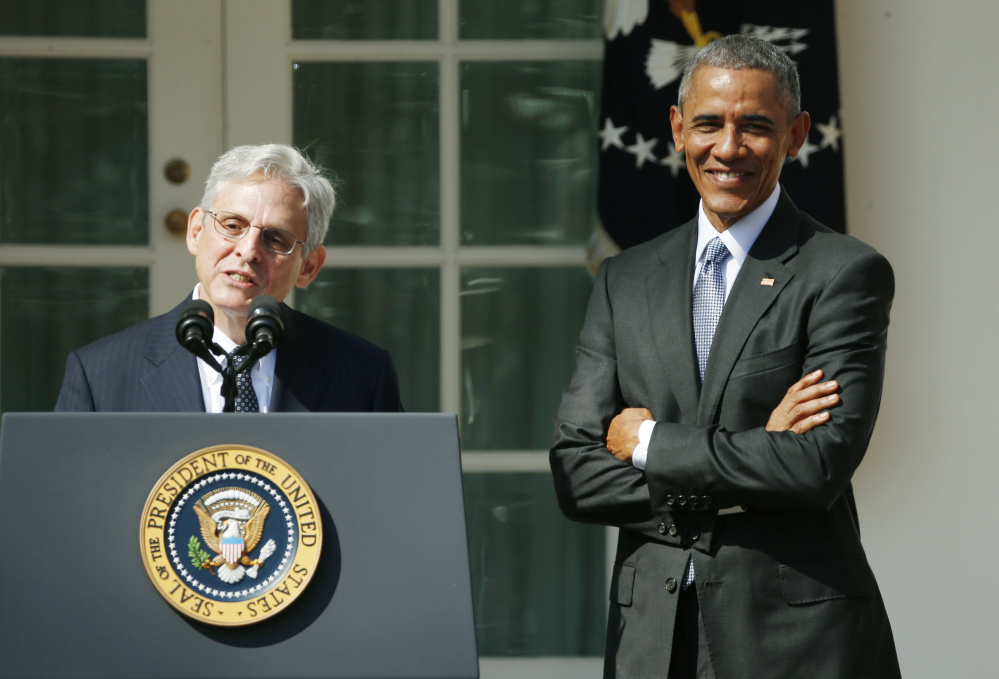WASHINGTON — President Obama’s selection of Judge Merrick B. Garland to serve on the Supreme Court launches a monthslong election year tug-of-war between Republicans and Democrats to determine the direction of the court.
Republicans senators vowed not to even consider the judge, preferring to leave the seat vacant in the hopes that a Republican wins the White House in November and makes a choice more to their liking.
“The American people may well elect a president who decides to nominate Judge Garland for Senate consideration,” Senate Majority Leader Mitch McConnell, R-Ky., said on the Senate floor. “The next president may also nominate someone very different. Either way, our view is this: Give the people a voice in the filling of this vacancy.”
Legal and political experts say it’s possible – but not likely – that Republicans will hold pre-election confirmation hearings later this year if the public puts enough pressure on them to vote.
REPUBLICANS MAY BE DIFFICULT
Or lawmakers could decide to consider Garland in the so-called lame-duck session after the November election if the presidential contest doesn’t turn out the way they want. They may be difficult, though, if Republicans lose control of the Senate on Election Day but hold office until January.
Sen. Orrin Hatch, R-Utah, a member of the Senate Judiciary Committee, told reporters Wednesday that he would be open to holding post-election hearings on Garland.
Even before the nomination was announced in a Rose Garden ceremony, there were TV ads targeting senators, partisans raising money off the conflict and opposition researchers digging for information. The conservative Judicial Crisis Network began targeting a possible nominee, an appellate judge from Iowa, for her work defending a client on child pornography charges who was later convicted of murder.
“It is tempting to make this confirmation process simply an extension of our divided politics, the squabbling that’s going on in the news every day,” Obama said. “But to go down that path would be wrong. It would be a betrayal of our best traditions and a betrayal of the vision of our founding documents.”
The White House has contacted all 100 Senate offices and has already heard from several Republicans who say they will be willing to meet with Garland, White House press secretary Josh Earnest said.
Garland will start making his traditional Capitol Hill courtesy visits Thursday, visiting individual senators in their offices. Senate Judiciary Committee Chairman Charles Grassley, R-Iowa, was planning to speak with Garland by telephone, and Sens. Kelly Ayotte of New Hampshire, Susan Collins of Maine, Jeff Flake of Arizona and James Inhofe of Oklahoma said they would meet with him.
McConnell told Garland in a call that he would not meet with him. “But he wished Judge Garland well,” the senator’s office said.
Some disappointed liberal advocates said Obama chose a moderate nominee who would be acceptable to Republicans, passing over other, more exciting choices. But conservative groups immediately called Garland “a partisan liberal with a record even he would envy.”
The 63-year-old graduate of Harvard Law School has served on the U.S. Court of Appeals for the District of Columbia Circuit since 1997. He was confirmed to the post with some Republican support on a 76-23 vote and now serves as chief judge.
Garland’s supporters and opponents alike are already campaigning, using every weapon in the modern arsenal. On Twitter, competing hashtags range from #DoYourJob to #NoHearingsNoVotes.
RIGHT THING TO DO ‘LACKS INTENSITY’
On Facebook, the White House has posted a video and slideshow introducing Garland to the public, featuring informal pictures of Garland and his family.
“A lot of it depends on public opinion,” said Jack Pitney, a former Republican Party official who teaches political science at Claremont McKenna College. “On one level the polls show people show support on the idea of holding hearings because it sounds like the right thing to do. But so far, that opinion lacks intensity.”
Republicans control the judiciary panel with an 11-9 majority, and its members include some of Obama’s most strident critics, such as Texas senator and presidential contender Ted Cruz. The hard-right conservatives will limit the Republican leadership’s maneuvering room.
Matthew Wilson, political science professor of Southern Methodist University, cautioned Republicans to be careful because they may end up with President Hillary Clinton.
Republican Sen. Lindsey Graham of South Carolina, who breached his party’s orthodoxy to vote for Obama’s first two Supreme Court nominees, Elena Kagan and Sonia Sotomayor, has been among the few Republican Party members to suggest possible compromise.
Still, Graham’s relative open-mindedness seems the exception to most Republicans’ determination to block Obama, promising a battle of both wills and tactics that will play out through the November election, and possibly beyond.
In particular, Obama’s supporters and opponents alike will be targeting potentially vulnerable Republican senators who are running for re-election in swing states including Wisconsin, Ohio, New Hampshire and Pennsylvania.
Send questions/comments to the editors.



Success. Please wait for the page to reload. If the page does not reload within 5 seconds, please refresh the page.
Enter your email and password to access comments.
Hi, to comment on stories you must . This profile is in addition to your subscription and website login.
Already have a commenting profile? .
Invalid username/password.
Please check your email to confirm and complete your registration.
Only subscribers are eligible to post comments. Please subscribe or login first for digital access. Here’s why.
Use the form below to reset your password. When you've submitted your account email, we will send an email with a reset code.